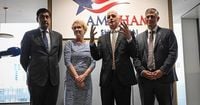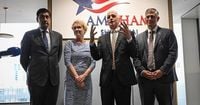In a week marked by diplomatic overtures and candid exchanges, a high-level U.S. congressional delegation wrapped up a five-day visit to China, underscoring the shifting dynamics of global power and the urgent need to recalibrate the rules of international commerce. The trip, led by Representative Adam Smith, a Democrat from Washington state, concluded in Shanghai on Thursday, September 25, 2025, and signaled an openness on both sides to rethink the post-World War II order that has long governed the global economy.
Smith, who chairs the House Armed Services Committee, was joined by fellow Democrats Ro Khanna of California and Chrissy Houlahan of Pennsylvania, as well as Republican Michael Baumgartner from Washington state. Their visit marked the first time members of the U.S. House of Representatives had traveled to China since 2019, following in the footsteps of a Senate delegation that made a similar journey in 2023, according to The Associated Press.
At the heart of the discussions was a recognition that the world has changed dramatically since the mid-twentieth century. Smith told Shanghai's mayor, Gong Zheng, that while the U.S.-led international system had "worked well for many countries, including China," it was clear that "things have changed." His remarks came at a time when Chinese leader Xi Jinping has been championing a new initiative for a more equitable global governance system—one that better reflects the rise of emerging powers such as China, India, and Brazil.
"We understand that things have changed," Smith stated, echoing a sentiment increasingly shared by both Chinese and American policymakers. As the trip concluded, Smith emphasized the need to renegotiate the rules of the global economy, saying, "China and the U.S. are the two most important players in how we resolve that. How do we get to an international rules-based order that is more agreeable to everyone?"
The meetings in Beijing and Shanghai were intended, first and foremost, to open up lines of communication between the two governments. Smith described the main purpose as fostering dialogue, particularly given the ongoing trade and tariff war that has complicated relations and created headaches for businesses on both sides of the Pacific. "We have a lot of work to do to resolve those issues," Smith told a small group of journalists after meeting with the American Chamber of Commerce in Shanghai, as reported by the AP.
Despite the trade conflict, Smith pointed to the continued expansion of American businesses in China—using McDonald’s as an example—to illustrate that commerce between the two countries remains robust. In a lighter moment, the lawmakers were later spotted at a Starbucks in the lobby of their office building, another sign that American brands continue to thrive in the Chinese market, even as political tensions simmer.
But beneath these surface signs of normalcy, the economic friction is real and persistent. Smith acknowledged that the trade conflict is "creating difficulties for companies on both sides of the Pacific." Tariffs and other barriers have disrupted supply chains, increased costs, and injected uncertainty into global markets—challenges that are especially acute in Shanghai, one of the world's busiest shipping ports and a city deeply intertwined with international commerce.
During a meeting with Mayor Gong, Smith pressed for a frank assessment of how the tariff war was impacting Shanghai’s economy. Gong responded that the city, "highly exposed to international trade," was among the most affected by the ongoing dispute. He welcomed the resumption of talks and negotiations between the two countries, noting that there had already been four rounds of meetings since May 2025, held in Geneva, Stockholm, London, and most recently, Madrid.
Gong articulated the Chinese government’s position clearly: "There are no winners in trade wars, but China will fight back if there is a war while remaining open to negotiation." This stance reflects a broader Chinese argument that the current international order disproportionately favors the U.S. and other wealthy nations. Rather than seeking to overturn the system, China says it wants to make it more responsive to the needs of all countries, especially those in the developing world.
A Foreign Ministry document cited by the AP put it succinctly: "The collective rise of emerging markets and developing countries necessitates boosting the representation of the Global South." The phrase "Global South" has become a catch-all term for nations seeking a bigger seat at the international table, and it was clear from the discussions that both sides recognize the legitimacy of these aspirations, even if the path forward remains contentious.
Smith, for his part, expressed hope that tariffs and other barriers to imports would eventually be reduced, paving the way for a more inclusive and fair international trading system. He called for a "robust debate" about how to renegotiate the rules of the global economy—one that takes into account the realities of a multipolar world where the U.S. is no longer the sole superpower.
While economic issues dominated much of the agenda, security concerns were never far from the surface. All three Democratic members of the delegation serve on the House Armed Services Committee, and Smith reiterated his longstanding call for deeper military-to-military communication between the U.S. and China. "Two of the largest nuclear powers in the world need to be talking to each other, particularly considering the fact that we do have some disagreements," Smith observed, underscoring the risks of miscalculation in an era of renewed great-power rivalry.
For many observers, the visit was a welcome sign that dialogue between Washington and Beijing is still possible, even as strategic competition intensifies. The willingness of both sides to engage—whether over coffee at Starbucks or across the negotiating table in Madrid—suggests that neither is eager to see the relationship deteriorate further. Yet, as the delegation heads home, the challenges ahead remain daunting: tariffs, trade imbalances, security concerns, and the fundamental question of how to share power in a rapidly changing world.
As the dust settles on this latest round of diplomacy, both the U.S. and China seem to recognize that the old rules may no longer suffice. The coming months will reveal whether this mutual recognition can be translated into concrete progress—or whether the world’s two largest economies will remain locked in a cycle of competition and cautious engagement.





